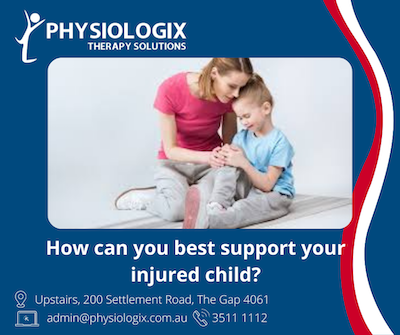Parents – Ideas on How You Can Help Support Your Injured Child
 Children and adolescents are a specialist age group for a physiotherapist to work with. On a physical level, their injuries are very different to adults since they have different pressures relating to their growth, hormones and the development of their still growing musculoskeletal system. They are also different on an emotional level. This means that it’s important to consider how these differences can impact on the support for your injured child. Here are some things we have learned in our practice.
Children and adolescents are a specialist age group for a physiotherapist to work with. On a physical level, their injuries are very different to adults since they have different pressures relating to their growth, hormones and the development of their still growing musculoskeletal system. They are also different on an emotional level. This means that it’s important to consider how these differences can impact on the support for your injured child. Here are some things we have learned in our practice.
Prepping:
The first trip to a specialist can cause fear, especially if the child is also in pain and concerned that the session may hurt them. The treating rooms themselves are a foreign space where a child won’t know what to expect.
Parents and carers can mitigate this by preparing the child prior to the visit. Let your child know what to expect and who they will be meeting. You can even show him or her the photos of our practitioners on our website so they know they’ll be seeing a friendly face.
This is especially important if:
• This is the child’s first visit to a physio
• The child has special needs (eg. Aspergers)
• The child has any anxiety, fear or pain
• If the child struggles with physical contact
Tell your practitioner:
We can much better support your child or teen if you let us know if there are any special issues or circumstances we need to be aware of. This prevents the uncomfortable situation of a parent or carer trying to discuss or avoid discussing special issues in front of the child.
Examples could be a child or teen utterly determined to enter a rep comp at all costs even if this could be detrimental to them. Alternatively, the child might be dealing with more serious contextual issues such as bullying or abuse.
If the practitioner has a heads up to possible issues then strategies can be proactively discussed. For example, allowing more time for the appointment or being careful to receive permission from the child before touching him or her.
At Physiologix, we believe an open door policy is vital to good communication. Our clients can phone at any time and have their issues discussed with the relevant therapist.
Communication:
Children and even teens may not be able to describe their injury well. This can be due to unfamiliarity with the practitioner, a general communication issue or to the fact that they aren’t clear themselves on how to describe their experience. This means that it is important that the parent be able to gently support the child in this communication if required, while still ensuring the child is empowered to participate in the conversation.
Structuring the appointment:
On the physio’s side it means we may need to take extra time to draw out the information or may need to find new and appropriate ways to communicate with the child or teen.
Making the appointment fun and interactive is essential. Often the adolescent catastrophises their injury – nothing like this has ever happened before – it’s major! Understanding their fear and putting them to rest is so important.
Exercises and Motivation:
Exercises are a vital component of the healing, strengthening and preventative focus of physiotherapy. These can be small and monotonous movements that take time to complete. This isn’t always magnetic to children or teens. Consequently they may lack motivation to complete their exercises at home.
At Physiologix we make it fun and also set specific targets by saying things like “I bet you won’t manage this for next time”. Youngsters hate adults thinking they can’t do things! We also avoid overwhelming the child so we limit homework to only a couple of exercises.
Specialist knowledge:
From an injury perspective, a specialist knowledge is needed. The research that continues to grow regards the development of this group is fantastic, giving therapists great insight in to newer and better treatment strategies. For example, boys in their late teens and early twenties are more likely to receive ACL knee ligament injuries from contact injuries garnered from playing football and being tackled etc.
But in girls they often happen from non – contact. This is because the way girls gain muscle mass and strength is very different to boys. Girls often have very poor landing strategies, either when running or jumping. They may not bend their legs when they land to soften landing impacts; their knees often knock in as they do things, putting the knee in a very compromised position and often not using hip muscles well to stabilise the leg, predisposing it to just “giving way” the result being major ligament damage and surgery.
Physios will look at a series of assessment tests to identify this group and can then integrate preventative exercises. At the end of the day, prevention is always better than a cure…..and usually a lot cheaper!
At Physiologix, our physios all have extensive experience, essential for the best care of your kids. Please call (07) 3511 1112 with any inquiries or email us from our website physiolgix.com.au




